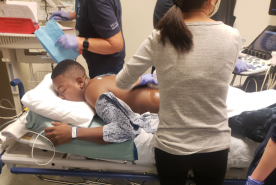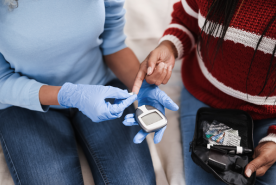Medullary sponge kidney (MSK) is a congenital disorder, meaning it is present at birth. MSK occurs when small cysts (sacs) form either on tiny tubes within the kidney (known as tubules) or the collecting ducts (a channel where urine is collected for removal). These cysts can reduce the outward flow of urine from the kidneys. One or both kidneys can be affected.
MSK is considered a rare disorder. The exact cause is not known and the vast majority of cases do not show a family history. Women are affected by MSK more frequently than men.
MSK is usually a benign disorder without any symptoms, but it can lead to other problems, such as urinary tract infections and kidney stones, as a result of the urine flow being blocked. In many cases, MSK does not cause symptoms or problems, but when it does it usually happens during adulthood. If problems do occur, it can cause pain in the side and back (known as flank pain), abdomen or groin. Other symptoms can include painful or burning urination, cloudy urine, blood in the urine (hematuria), fever, chills and nausea. These symptoms depend on the cause and severity of urinary blockage. Kidney failure occurs in about 10% of people with MSK.
How is Medullary Sponge Kidney Diagnosed?
If you have a history kidney stones or urinary tract infections, your doctor may use an imaging test to help confirm if you have MSK. Diagnosis may involve a type of x-ray procedure called an intravenous pyelogram (IVP), also called an intravenous urogram. This procedure uses a special dye that is injected to help your doctor visualize the kidneys and look any problems, such as cysts in the kidneys or blockages in the urinary tract. Other possible imaging tests include an ultrasound or computed tomography (CT) scan.
Your doctor may also take blood and urine tests to see how your kidneys are working and to look for any signs of infection. Your doctor may also check to see if there is blood in the urine (hematuria).
How is Medullary Sponge Kidney Treated?
Once a diagnosis is confirmed, your doctor will regularly monitor your kidneys for changes in the kidney cysts or signs of recurrent kidney stones and urinary tract infections.
Urinary tract infections are usually treated with antibiotics. Kidney stones can pass through by themselves, or may require surgery if they are too large to pass through. After you are treated, you might be advised on ways to prevent future kidney stones or urinary tract infections, such as increasing fluid intake and getting regular check-ups. More information on treating and preventing kidney stones and urinary tract infections can be found in following NKF fact sheets:
If you would like more information, please contact us.
© 2015 National Kidney Foundation. All rights reserved. This material does not constitute medical advice. It is intended for informational purposes only. Please consult a physician for specific treatment recommendations.

















